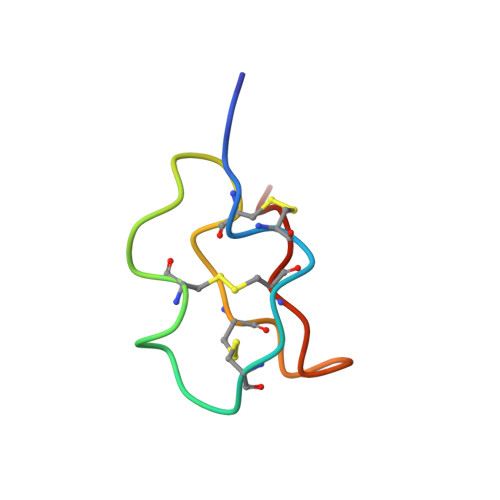Identification and characterization of a wolfberry carboxypeptidase inhibitor from Lycium barbarum.
Huang, J., Wong, K.H., Tan, W.L., Tay, S.V., Wang, S., Tam, J.P.(2021) Food Chem 351: 129338-129338
- PubMed: 33647700
- DOI: https://doi.org/10.1016/j.foodchem.2021.129338
- Primary Citation of Related Structures:
6JIC - PubMed Abstract:
Hyperstable cysteine-rich peptides (CRPs) represent an underexplored superfamily of bioactives in functional foods. An example is wolfberry of the Lycium barbarum family. Previously, we discovered a CRP, designated α-lybatide, from L. barbarum bark. Herein, we report the discovery of β-lybatide, a novel carboxypeptidase inhibitor belonging to a different CRP family from the wolfberry plant. Proteomic and transcriptomic analyses showed that β-lybatide contains 36 amino acids with six cysteine residues. NMR spectroscopy revealed that β-lybatide displays a knottin-like structure that renders it highly resistant to thermal, chemical and enzymatic degradation, conditions important for keeping its structural integrity in gastrointestinal tract. Biochemical assays showed that β-lybatide is a potent carboxypeptidase inhibitor which could contribute to the wolfberry biological activities. Bioinformatics analysis revealed an additional 49 β-lybatide-like plant carboxypeptidase inhibitors. Together, our results show that β-lybatide is the first and the smallest plant-derived hyperstable carboxypeptidase inhibitor discovered from a functional food.
- School of Biological Sciences, Nanyang Technological University, Singapore 637551, Singapore. Electronic address: huan0273@e.ntu.edu.sg.
Organizational Affiliation:
















